Who is Desiree RD? (And Why We Love Her at Silver Hills!)
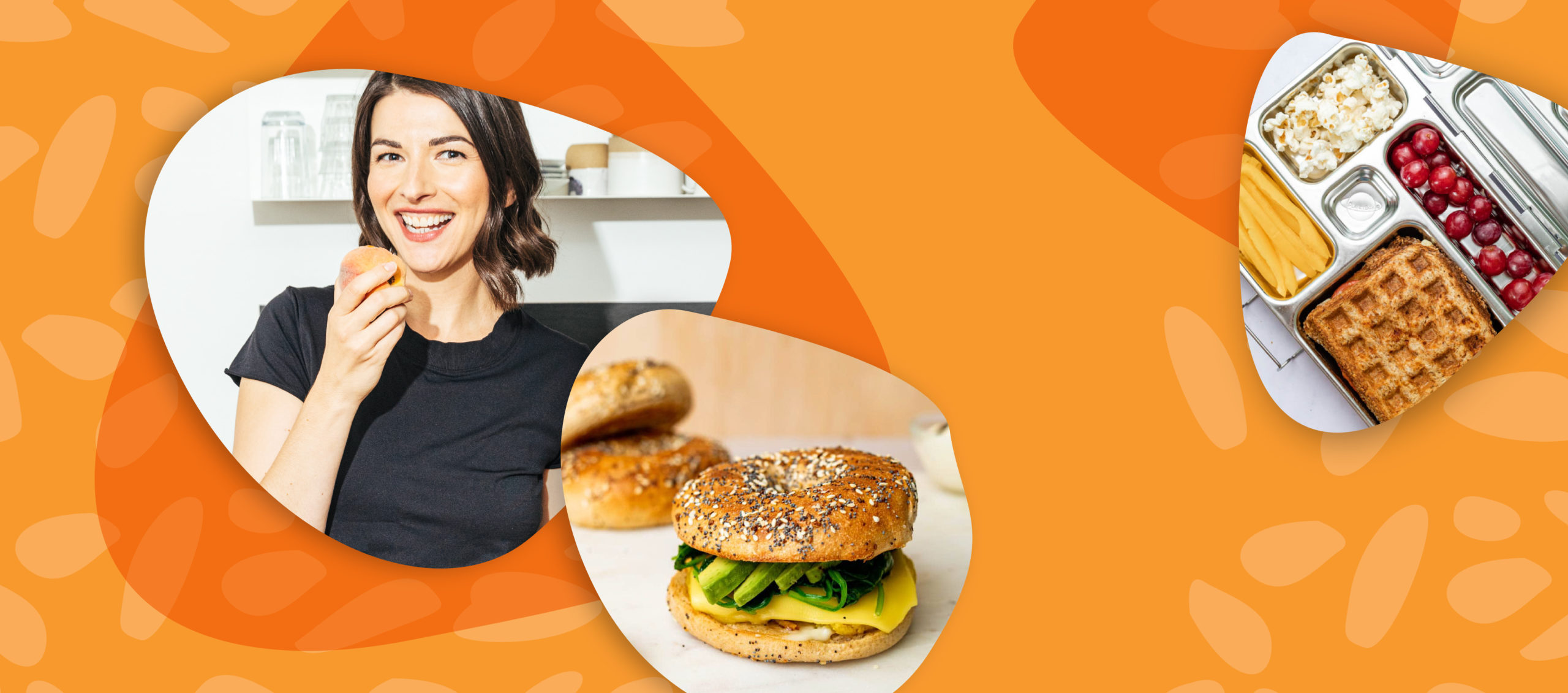
Registered dietitian. Bestselling plant-based cookbook author. Gut health geek. Why we’re fans of Desiree Nielsen (and the feeling is mutual)!
Passionate provider of evidence-based advice on gut health and plant-based nutrition, registered dietitian Desiree Nielsen isn’t our favourite content contributor just because she’s a long-time fan of Silver Hills Bakery. Or because she’s a subject matter expert who raves about the goodness of sprouted whole grains every day (and has the professional credentials to back it up).
We love partnering with Desiree RD because she shares our belief in the power of plant-based food and simple choices to help people live healthier lives.
For over 30 years, everything we do at Silver Hills Sprouted Bakery has been guided by our belief that investing in your health is the greatest gift you can give to the people you love—including yourself. Because when you’re healthy, you have more to share.
We know Silver Hills Bakery’s sprouted whole grain breads may just be a small slice of your healthy eating journey each day. And the whole food, plant-based recipes and evidence-based nutrition articles on our website are tiny tools in an ocean of information on the internet.
But our mission with Silver Hills Bakery’s sprouted products and content remains humble and steadfast—to help make healthy eating easy for you and your family.
And we couldn’t have found a more joyfully aligned partner on that mission than Desiree!
Packed with inspiration, this Q & A with Desiree is no mere get-to-know you interview. Our chat with her left our team with hearts full of hope, heads full of healthy tips, and smiles for our shared love of sprouted grains, and simple, plant-based food.
Read on to learn all about Desiree’s positive nutrition approach, why she loves being an RD, and how she can help you and your family eat healthy (even on the busiest days of your week).
In this article:
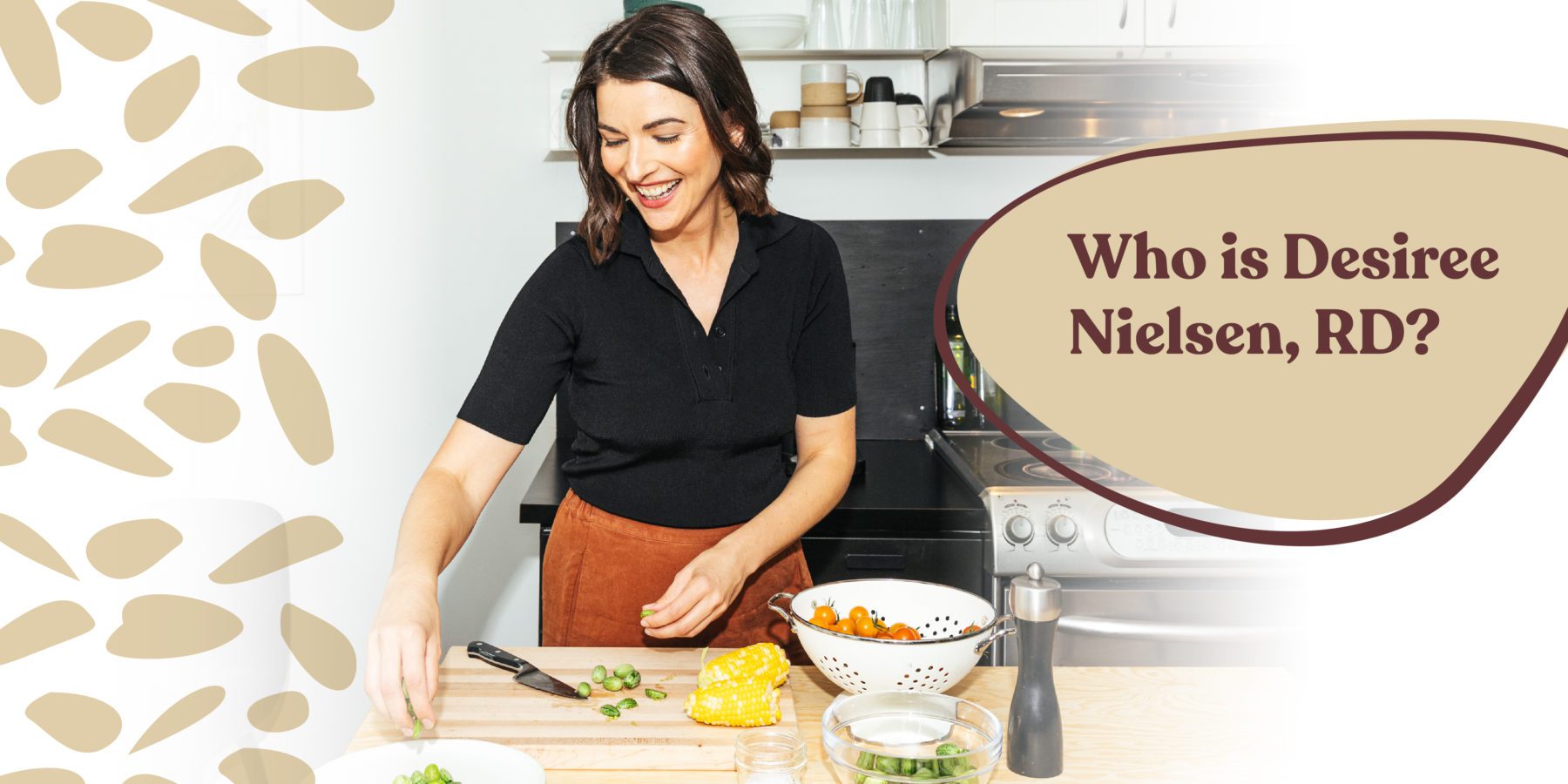
You’re a mom, a bestselling health and cookbook author, a registered dietitian passionate about plant-based food and digestive health, a podcast host, and a long-time fan of Silver Hills Sprouted Bakery. What brings you joy—or what do you do for fun—outside those things?
“I used to joke that I wasn’t a very well-rounded person—my work, my hobby, and my life is pretty much rooted in food and nutrition!—but I’m trying to evolve as a human.
I really love being outside in nature. In terms of what brings me joy, being outside brings me so much joy! We’re so lucky here in Vancouver, whether I’m on the beach in the middle of winter going for a beach walk, or in the mountains, being in nature makes me really happy. And getting to do that with my kids is even better (they’re extra well-behaved outside!)
I’m also a huge reader. And not just non-fiction—I really love fiction, too. So, I’ve been making more time for that again.
And I’m also a big music lover. I use it the way some people use aromatherapy—to shift the energy and my mood—and I find it really effective at doing so!”
You’re a busy parent—what’s your secret for finding time to read?
“Bath time is a big one for me. I take a bath and read after the kids have gone to bed. And they’re a bit older now, and I’m starting to train them that if I have a book in front of my face it’s like a do not disturb sign!”
What inspired you to become an RD?
“I didn’t even know what a dietitian was; I studied nutrition because I wanted to be a doctor.
When I was a teenager, I discovered the work of Dr. Andrew Weil. For people who don’t know him, he looks like, well…Santa Claus. And he was sort of the grandfather of Integrative Medicine.
I discovered his books strolling through the bookstore, and his work changed me. I was reading his books and going, “Oh, wow! Just buying flowers for yourself every week can bring joy into your life and give you something beautiful to look at. And that can change your mental outlook.”
He spoke about health in such a holistic way, and it got me really excited about how powerful it is to live intentionally—and what that can do, not just for your physical health, but for the quality of your life in general.
The more I dug into his work and he talked so much about nutrition, it made me want to be a lifestyle medicine-focused physician. So, I went to UBC (University of British Columbia) excited to study nutrition because I knew doctors didn’t get a lot of nutrition education in their degree.
And when I got into the Nutrition faculty at UBC, I was like, “What does a dietitian do?”
I had no idea! I had never seen a dietitian when I was younger. I didn’t know anyone who was a dietitian. I really didn’t know what a dietitian did!
Being in the Nutrition faculty and learning more about dietetics, I thought, “I feel like a lot of the things that I would do as a doctor I could actually do as a dietitian.” So, I decided to take the leap and said, “I will be a dietitian for five years, and if it’s not everything I want it to be, I’ll write my MCAT (Medical College Admissions Test), I’ll find some medical school to let me in, and I will make it happen!”
But I honestly never looked back.
Making an Impact as a Dietitian, One Connection at a Time
Dietitians are lucky because we often get more time with our clients and patients than doctors do to really dig in, because lifestyle medicine isn’t as simple as offering a prescription, right?
People make multiple food choices every single day of their lives, and we need so much support and guidance—particularly now that we’re inundated with often quite terrible nutrition information all over our social media feeds.
That’s why it’s so important for me that I do what I do now with the books, and my blog, and social media.
I realize I’m one person. What can I do? There are so many voices out there, sharing truly harmful information that we need a whole army of dietitians—and each one of us with our little bubble that we connect to can help ease people’s minds and help them set a nourishing pathway for themselves.”
Why do you love what you do?
“I love being a dietitian because food has the power to transform lives for the better.
Not only that, but the very act of eating can be so pleasurable. It’s one of our only opportunities multiple times a day to bring a little bit of pleasure, fun, or joy into our day on a regular basis.
But also, because when we nourish our bodies with what they need, we feel so much better. We have the energy it takes to look after our kids, to crush it at work, or just to feel good in our skin.
I think what’s so incredible about being a dietitian—both when I saw one-on-one clients and had that immediate connection with people, and in my role now as more of an educator—is to hear someone say, “I took this piece of advice, and now six months later, I’m plant-based.” Or “I used to feel so sluggish and I discovered I had gut problems, and now they’re so much better because I read this thing you shared.”
That’s pretty incredible!”
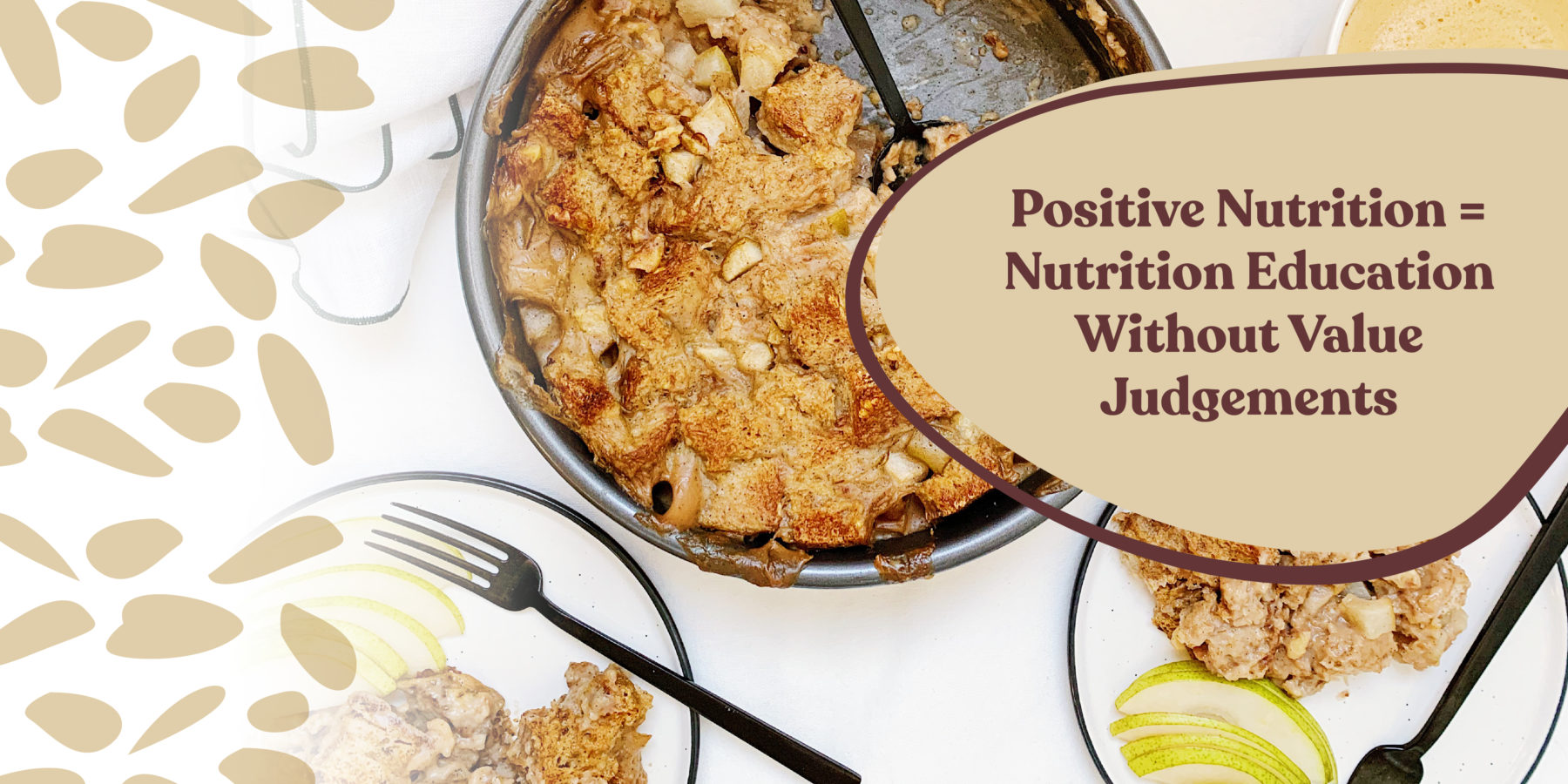
You talk about being evidence-based. With all the misinformation out there, what can you tell us about choosing your positive nutrition approach and giving evidence-based advice as a registered dietitian?
“As my community has grown, one of the things I feel acutely is that we have to be very careful about how we share nutrition information online.
We have no idea what someone’s background is, what their current relationship with food and their body is. And even providing what some health professionals might think is innocuous nutrition information can be truly damaging for people.
So that’s why my core philosophy is to practice what I call “positive nutrition.” And that’s not just to be like, “Yay! Food is awesome!” (because it is!) but it’s that I would much rather focus on what to eat more of than what not to eat.
[Most nutrition advice] utterly forgets that our body is literally built of the nutrients we ingest, so we are made of what we do eat—not what we don’t eat!
And so, I would much rather encourage people to eat more plants because that’s something that anyone can do, whether they’re an omnivore or a vegan. Everybody can eat more plants!
I want to talk about nutrients and what they do in the body. I try to avoid topics that many people have value judgements on, such as calories, for example. Because calories don’t really tell us much of anything about the nutrient density of food.
If we think of calories and what they truly are, they’re a measure of energy. So, when we put calories in our body, we are giving our body energy. But there’s so much wrapped in this idea of calorie counting. (Is this too many calories? Not enough calories?).
I would much rather just take that whole conversation off the table. And instead, be like, “Hey, here’s fibre. Fibre is really cool because it helps to regulate your digestion. It helps to feed the gut microbiome.” And people aren’t like “Oh, too much!”—they don’t have a value judgement about fibre. It’s just like, “Hey, this is cool. I want to put more of this into my body!”
It’s the same thing with iron. We can all agree that iron is a good thing because you make red blood cells out of it and that’s pretty important! So, I would rather talk about what matters most in nutrition—which is simply making sure your body gets what it needs.
[Your body] knows how to do everything. You don’t need detoxes. You don’t need wacky diet schemes. You just put the nutrition in, and your body will do its thing!”
We love what you say about focusing on more, not less. Tell us more about that mindset and what it means to you.
“In our culture, much of what we think of as regular, healthy eating and nutrition is very much about diet culture. And there’s so much that we have to unpack about our own beliefs about nutrition.
Most of us come from a very restrictive mindset around food. And how unfortunate that is, because food is so joyful—it’s literally the thing that keeps us alive! It’s such a potentially positive force in our life.
And even if I can just help one person be less restrictive, or think in a less restrictive way about food, and just focus on the bounty and abundance of plant-based eating, then I’ve done it.”
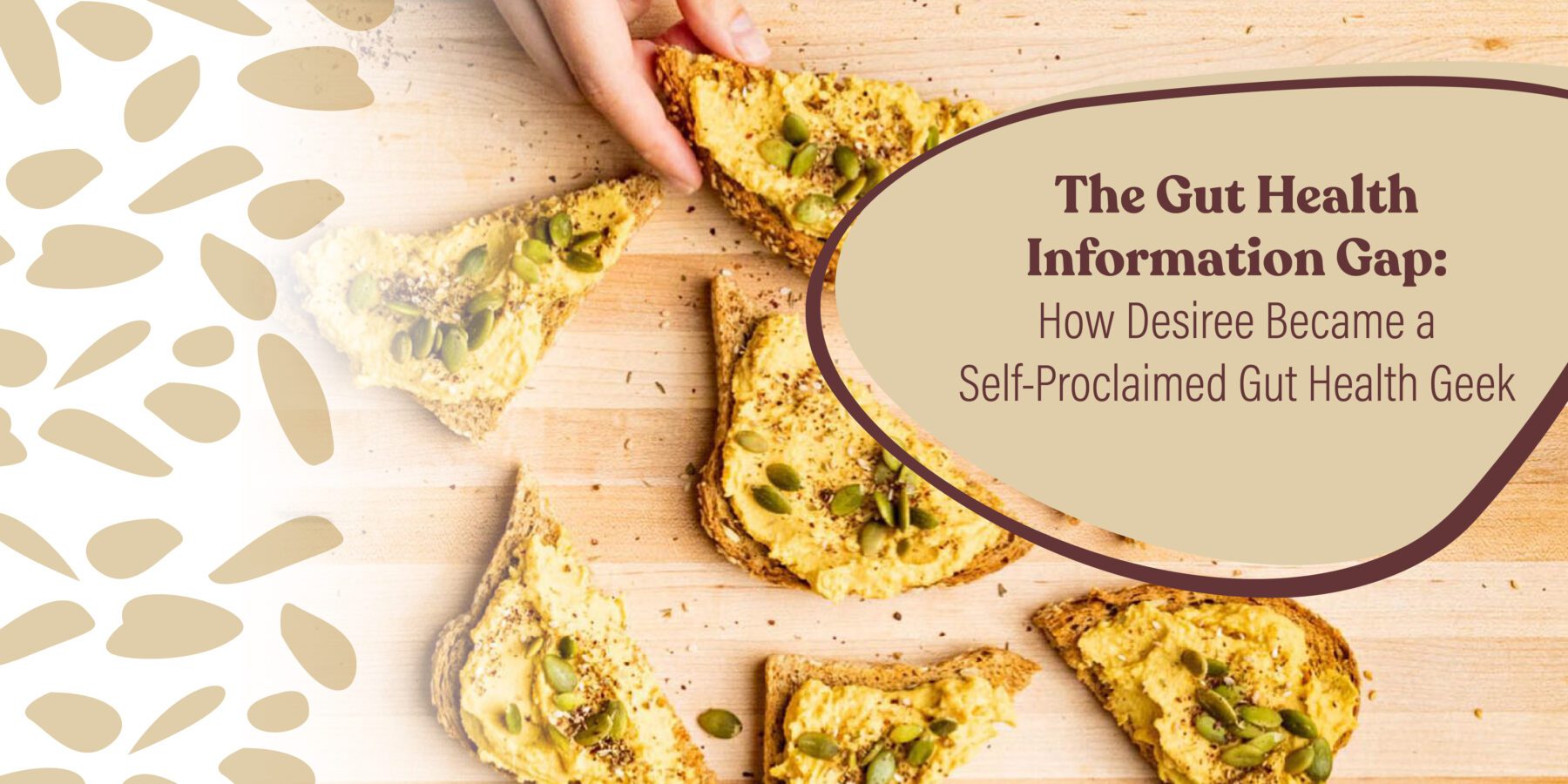
Your latest book—Good for Your Gut: A Plant-based Digestive Health Guide and Nourishing Recipes for Living Well—shares a holistic, plant-based, personalized, evidence-based approach to the topic of digestive wellness. Tell us about your passion for gut health, and your add-instead-of-eliminating, no-one-size-fits-all-answer approach to nutrition, and where it came from.
“Gut health was not on my radar when I became a dietitian. Like pretty much whatsoever in our degree, even in my internship, I didn’t have a ton of exposure [to the topic] beyond a few weeks on each side that was devoted to gut health.
I knew what celiac disease was, what Crohn’s and colitis were because they had Clinical Nutrition directives. But I didn’t think much about gut health until I landed in my first job which was as a registered dietitian in a health food store.
Many of the customers who came to us and sought out the dietitian had things going on with their gut. They had celiac disease, so they were looking for gluten-free foods. Or they had IBS (irritable bowel syndrome). But because it was nearly 15 years ago, IBS was still a little fuzzy, and [the medical community] didn’t know if it was a real thing or not—so there were many people who needed help.
As a dietitian, I was like, “Wow. Okay. It’s time to roll up my sleeves, get my books back out and look into what is going on in the body. What do we have in terms of nutrition research?” And I really just dove into it because I wanted to be able to serve our customers the best that I could. Because gut health back then was not the trend it is now, all these people were suffering, but there was not a lot of information out there to help them.
Gut Health Got Personal
And then as luck would have it, after the birth of my first child, it became a little less professional and more personal—because I ended up with IBS.
[So, after ruling out celiac disease and other conditions through testing, with my own IBS diagnosis as motivation], I dove even further into the research. And I started using myself as an experiment of one. “What happens if I do this?” or “What happens if I do this?”
Luckily these days there is way more research going on, but it just became such a passion—both because I knew people needed it, and I was able to give people help they weren’t finding elsewhere. And it feels so good to help people feel better! That’s definitely self-sustaining!
The more the research [on gut health] grew, the more fascinated I became by the gut. When I learned about it in school, it was taught to us like [the digestive system] is this very basic machine. You put the food in. It munches it up. You absorb what you need. You get rid of the rest. Just a machine.
But the gut is so much more than that, and our information and knowledge about it is constantly evolving.
Like how the immune system is tied to the digestive tract—how something like 70% of our immune function is centred in and along our gut. Or how our gut is so heavily innervated [(meaning it has a complex network of nerves)], and 90% of the information that travels between the gut and the brain is coming from the gut to the brain. And then you throw the microbiome in there…
The gut is just the nerdiest, most complex topic! So, it keeps me energized about learning because there’s always more to learn (and I’m super nerdy!!)”
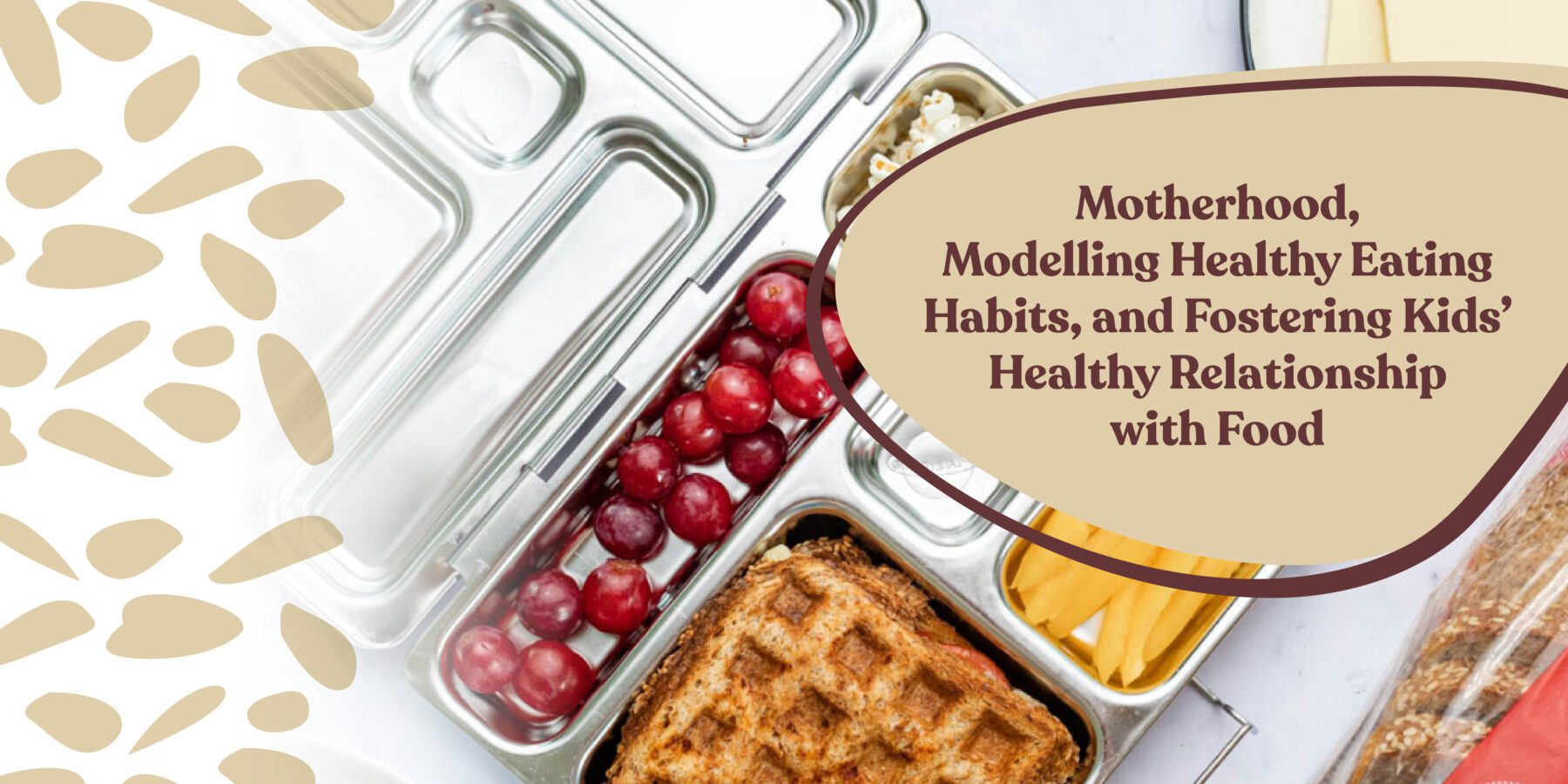
How has being a mom changed or influenced your approach in creating the plant-based nutrition and recipe content you share in your blog, books, and videos?
“Having kids definitely chilled me out. A lot! Before I had kids—when it was also sort of the early waves of wellness [as we know it today]—I was a little more rigid in my own beliefs about nutrition.
And that carried on for the first couple of years after having my oldest, because I was like, “They’re not going to have any sugar!” and “They’re not going to have this!” Then we became busy as a family, and it turned into, “Here we go, it’s take-out!”
But learning to chill out wasn’t only about the busyness of life with kids. As I watched them eat, it became really important to me—probably the most important thing for me—that my kids had a good relationship with food.
And that [wanting my kids to have a healthy relationship with food] was the driving force behind my own philosophy shift, and how I talk about nutrition. Because I watched the language that other people used about food and nutrition around my kids, and it stung because I didn’t want them to have those thoughts and ideas—so that’s the biggest way having kids changed my nutrition philosophy.
The other thing that changed was that I realize that bodies are just so much less fragile than we make them out to be. Particularly in nutrition! I think back to when I was a kid—and all the things I ate, or didn’t eat!—and I turned out just fine and totally healthy.
And I try to remember this with my youngest, who’s a little bit more…she’s a lot more of a selective eater than the rest of us! She’d be like [“YUCK!”], and then [I learned to respond with], “Okay, here’s your multivitamin, kiddo!” and “Okay, you didn’t like dinner? That’s fine. That’s fine… You’ll be fine!”
So, that’s my big thing, is that I think for kids, it really changed my philosophy around how the relationship with food is most important. [And as a parent it’s about] modelling healthy eating habits.
And modelling healthy eating habits both means putting healthy foods on your plate, but also putting those foods that people quote-unquote don’t think are “healthy” [on the menu], too. For kids to see that a healthy life looks like kale and sprouted grain bread. But it also looks like getting ice cream on the weekend. That’s foundational.”
For those with kids who are selective eaters, can you share more about using what they will eat to take away some of the stress of worrying about what they won’t eat?
“Honestly, sprouted grain bread is the one [food that makes me feel like I got my kid to eat something good today]. For my youngest, when she doesn’t want to eat dinner, I’m like, “Oh, toast!” Because [with a slice of sprouted grain toast] she’s getting minerals, and she’s getting fibre.
She’ll eat pretty much all fruit. She’ll eat sprouted grain toast. And then she’ll drink soy milk. And that’s okay. Because if that’s all she’s getting, that’s still a decent amount of nutrition!”
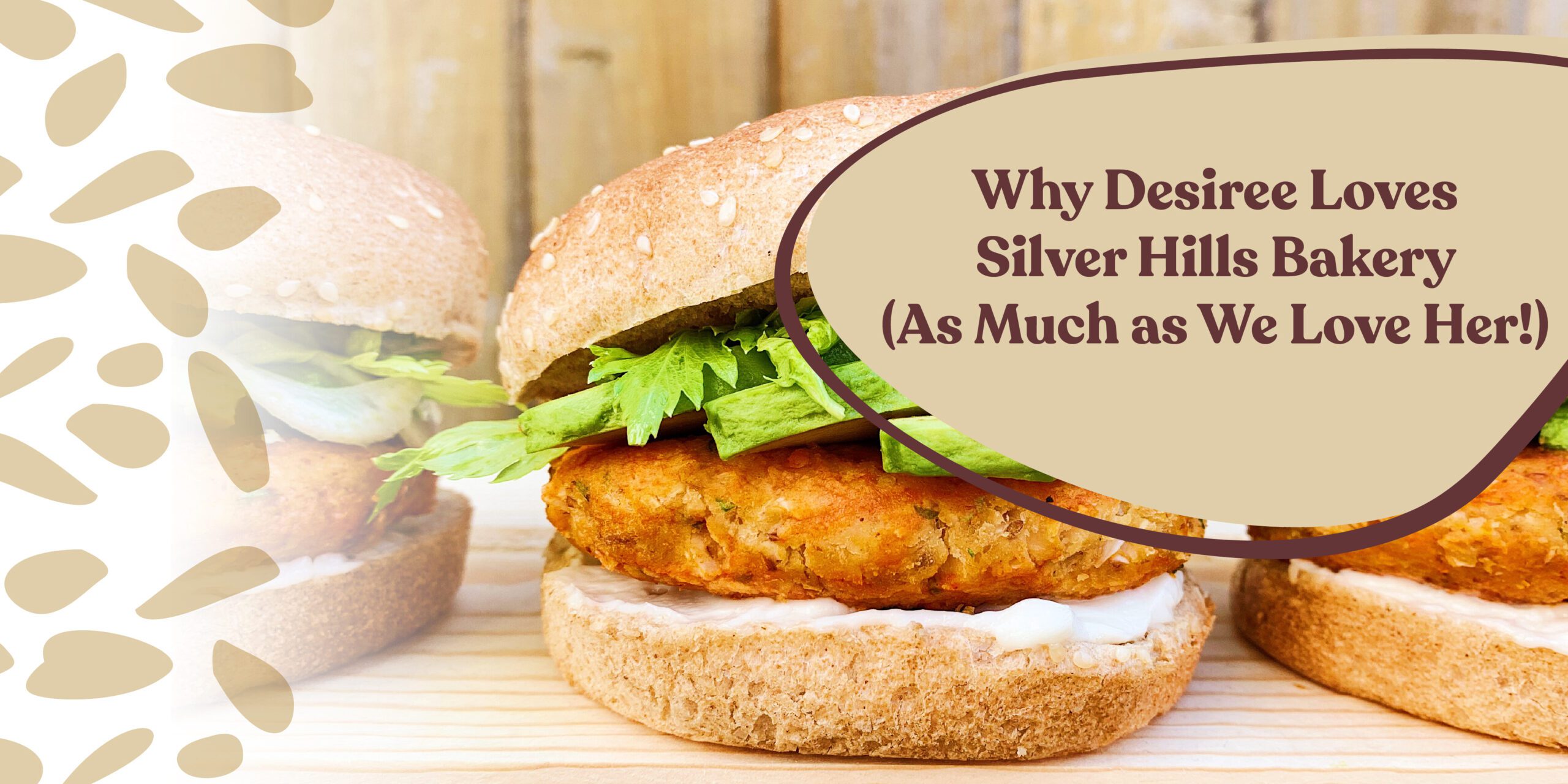
You were a fan of Silver Hills Sprouted Bakery before we partnered with you as a subject matter expert and content contributor. Tell us the story of how you discovered us.
“I discovered Silver Hills in the aisles of the health food store in which I worked. Part of my role [as a registered dietitian] was to do grocery tours at the stores. That’s where you go through all the aisles and show people how to make nutritious choices in each section and show them the healthiest options [for them] in each section.
In doing those tours, that’s where I discovered Silver Hills, because without a doubt it is the most nutrient dense sliced bread on the shelf. And very quickly I was like, “Well, this is the thing that I want to eat! This is the thing that I’m sharing with all of our customers!”
And Silver Hills Bakery has been our everyday bread—the bread that’s always in our house, that we use every day—for literally almost 15 years.
Honestly, the first day that Silver Hills came to me as a partner, I was like “[YAY!] It’s like my favourite thing!!” So, it’s just so nice to work with something that’s actually such an integral part of our lives—my everyday diet—which is really fun!”
What do you love about Silver Hills Sprouted Bakery?
“There is a lot to love about Silver Hills!
As a gut geek, you just can’t get over how much more fibre Silver Hills has than other breads. And the plant-based protein! Just having two slices of sprouted bread with some natural peanut butter and a bit of jam and you’ve got like 17 grams of protein there—that is legitimately a good, protein rich meal.
I also love that it’s a simple swap. Having a positive nutrition focus, I recognize that people don’t have the time—nor should they be spending a ton of time concerning themselves with nutrition in their everyday life.
Nutrition is just meant to be a tool to help you live well. It’s not supposed to be like your full-time job. (Unless it is your full-time job!) But for everyone else, it’s not. So, I love the power of simple swaps that dramatically impact your nutrition.
If someone just takes a regular sandwich bread and they switch to sprouted grain bread, they get more fibre, more protein, and more minerals—without actually changing how they eat.
[When someone says,] “I just want to make a sandwich!” I can say, “Great! We’re going to do it with sprouted grain bread. We’re going to throw some baby spinach on there,” and instantly that sandwich just got way more nourishing.
And I love any time I can give people those tools because we only have so much energy to make change and think about how we eat.
You’ve been a subject matter expert and content contributor for Silver Hills Sprouted Bakery for several years now. Tell us why you partnered with us—and why you love working with Silver Hills.
“Like I said, I was pretty excited when I first got that email from Silver Hills [about a potential partnership] because, as a dietitian, it’s very important to me that I only share foods and products that I absolutely love, that are a part of my life and my family’s life.
And it was such a natural fit for me, I was excited to work with Silver Hills. But the other thing I love is that Silver Hills also takes a very positive messaging approach to food and nutrition—it’s about nourishing yourself well to lead a healthy life.
[Silver Hills Bakery] is a company that I feel has a lot of integrity in not just the quality of the products they make, but in how they make them and share them as well. And they’re also such great ambassadors for plant-based eating and nutrition in general. So, I feel that they’re aligned with my own nutrition philosophy, and really love working with [the team at Silver Hills]!
The other thing I love is that in the grocery store, I learned very early on that being a dietitian where people make their food choices is probably the most powerful [place to be]. Because as dietitians we are taught very much to educate about nutrition. It’s like, “Let’s talk about how much fibre you need,” or “Let’s talk about how to manage sodium.”
The grocery store is where you’re making your food choices, and I want to be here when you make them. So, if you’re like, “Well, I don’t know which bread has the most fibre,” or “I don’t know which pasta sauce has the least sodium,” I can be there alongside you.
That’s why I love partnering with brands like Silver Hills, because when we’re educating about the benefits of a product, and why you should choose this product, I feel like maybe having a dietitian there is a great thing.
[Working with a brand that deeply believes in evidence-based, whole food, plant-based nutrition] is something I always feel grateful for, because everybody’s so into nutrition right now and there are a lot of voices out there providing advice.
I’m grateful when a brand like Silver Hills chooses to work with me as a dietitian because—just as much as my role and my professionalism can help reinforce the messages they want to share with their audience—it also helps introduce people to what dietitians do.
[Working with brands like Silver Hills gives me a place to answer questions like,] “What is a dietitian like?”, “What does a dietitian talk about?”, or “Are dietitians all just diet stuff and calorie counting?” It’s an opportunity for me to show people: This is the role of a dietitian: to share delicious food, to help you feel nourished, feel energized—and keep things really positive, too.”
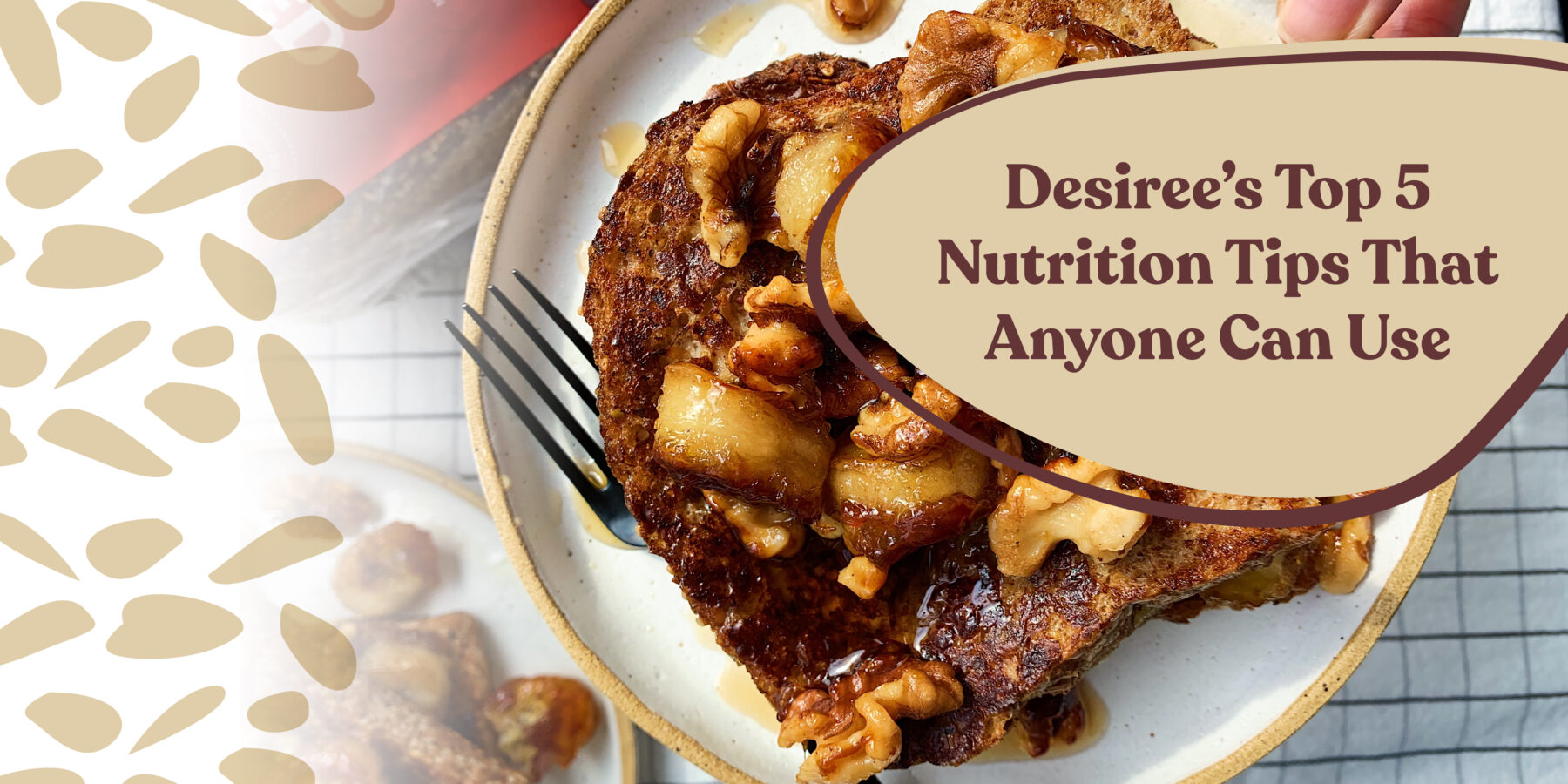
Although you advocate against one-size-fits-all nutrition advice—because what’s right for one person can be totally wrong for another—what tips would you share that can help busy families eat healthy and start or stay on a holistic path to wellness?
The simple swap is absolutely a top tip. Swapping Silver Hills sprouted grain bread for your usual bread is a perfect example of a simple swap!
Another tip? Relax a little bit. I think we make nutrition more challenging than it should be.
So, take a deep breath. Did you put some fruit in the fridge? Did you put some vegetables in the fridge? Did you put some proteins in the fridge? Did you put some whole grains in there? As long as you are getting those four types of foods every day, in some combination, you are doing alright.
My next tip: Simplify. Meals can be simple—they don’t always have to be extravagant affairs.
It is absolutely okay to do a chickpea tuna sandwich with some sliced veggies for dinner. It takes 10 minutes. And that’s a complete and nourishing dinner. It doesn’t have to take you all night—because most of us don’t have all night!
Got kids? My best tip for parents: get kids involved.
If you start them early—and I admit they are not much of a time-saver to you when you start them early—[your patience pays off]. My 12-year-old just made the bulk of the recipe we did last night.
It helps as a parent because when kids are involved in making food choices and preparing food, they are more likely to eat the food, which saves you a lot of stress at the dinner table.
Learning food skills and making food preparation a positive experience as a family helps to not only build those skills in your kids, but also helps them foster a positive relationship around food and their bodies as well.
And that happens starting very, very young.
What else would I say in terms of the nitty gritty of day-to-day nutrition? Have 5 back-pocket recipes.
On weeks when everybody’s got lots of activities, and you’re all really busy, and you’re working a lot, having five back-pocket recipes [is a sanity saver].
Don’t do a Pinterest board with 700 recipes, because we all do that. We all save these recipes and we’re still like, “I don’t know what to eat tonight!”
Have five.
Have a chickpea tuna sandwich. Have a pasta—a simple pasta with tomato sauce or cashew Alfredo. Just have five basics that you can whip together in 20 minutes. When you go to the grocery store on Sunday, keep the ingredients for those foods on your list, so they’re already in the house for those nights when you’re just like, “Bah! I don’t know!” And you can make the sandwich. You can make the pasta. You can make the lentil soup.
That’s really helpful.
So many of us grew up with “We eat tacos on Tuesdays” and “We have pastas on Thursdays.” There’s a reason our parents did that. To take the thought out of it, and just put it on autopilot.
It is totally okay to do that!”
We love your tip to relax—if health is a holistic thing, and you’re stressing so much about putting nutrients in your body, it’s almost a moot point. What can you share to help people relax and find balance in their relationship with food?
“When I was still in one-on-one practice, I saw that a lot. People who come in because they’re like, “I just want to make sure I’m doing everything I can.”
And on paper, it sort of looks like they’re doing “everything right”? But when you speak with someone, you see how much tension and perhaps fear they have over making the wrong decision. And sometimes the role of a dietitian is to just say, “You know what? It’s okay. Maybe you should go out for an ice cream every once in a while.” Or “It’s okay to go to a restaurant where maybe you don’t have control over what you’re eating.”
Sometimes I feel like there are two camps: the people who just don’t think about nutrition at all, and the people who think about it far too much. And you’re always trying to strike that beautiful—and sometimes hard to achieve—middle ground.
Health is a very holistic process. And I think the other thing that’s so important to realize is that health is not a destination.
It’s not like, “Oh, if I do all of these things right, I will arrive at health and it just stops, right?”
Health is something that we practice every single day. It’s realizing that we’re not energized, so maybe we have a 3:00 PM green smoothie to help get our energy up. Or realizing we’ve been working too much, and so we choose to go to bed an hour earlier for the next few nights.
It is about being in your body, saying, “What do I need right now?” And adjusting accordingly.”

Get More of Desiree RD’s Practical, Plant-based, Positive Nutrition Advice: Recipes, Articles, and Videos!
We can’t get enough of Desiree’s real-life-easy, evidence-based, positive nutrition approach and gut health advice—or her delicious plant-based recipes that help put healthy food on your plate every day of your busy week.
Check out our Best of Desiree RD content collection below for a healthy helping of sprouted inspiration right here on SilverHillsBakery.com.
Want more? Here’s where you can get your fill of wholesome plant-based nutrition and recipe content from our favourite registered dietitian:
Listen to The Allsorts Podcast (available free on iTunes, Spotify, Stitcher, or wherever you stream your favourite podcasts)
Sign up for Desiree’s newsletter
Cook from her Eat More Plants Cookbook or get her latest, Good for Your Gut (available in print and audiobook!)
